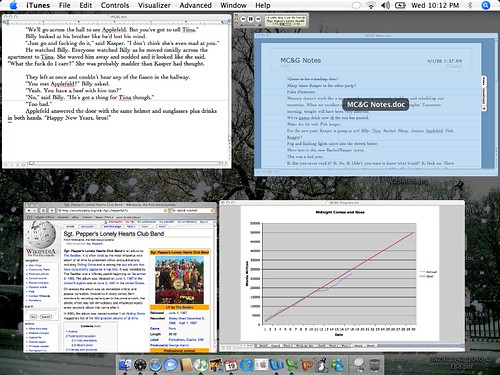30.4.06
Woke up Saturday to discover that a presumed asshole used a large rock to smash off the driver's side tail light of our car. Saturday was to be the last push on the novel, so, uh, not that anyone cares but I'm giving myself an extension. I've got 4,000 words left. Carry on.
26.4.06
Jetlag
Couldn't think of the word. Had to Google air travel time mental to get it. There is a nectarine where my brain should be. By the time I'm 29 I will wear a sign around my neck providing my name and home address for whoever finds me sleeping in the library or wandering around abandoned rail yards.
MC&G #007: Etiquette
When stretching to reach the daily word quota, my characters tend to stop interrupting each other. Everyone is allowed to finish their thought and responses take the form of complete sentences.
24.4.06
Horizontal
From an interview with David Means:
A feeling of panic came over me as I read that. It's perhaps a perfect criticism of the novel I'm pushing to finish in the next week.
I think the stillness you mention comes out of what Andre Dubus called vertical writing, rather than horizontal; going down deep, and deeper, into the situation instead of moving to some end point. If you don't have that stillness in short fiction, you end up leaning too hard on plot, or irony, or some technical device. Or maybe if you use plot too much, or you're ironic, or silly, you can't have that stillness. In part I think it's inherent in the form. There's a great story by Eudora Welty called "The Whistle" that is so still and quiet and lovely it's amazing. Maybe it's the fact that survivors, or those who suffer, tend to find solace in those moments of silence. But I agree with Baxter's general premise, although I don't think you can make a conscious decision to include stillness in the work. You can't just say: I'll slip some stillness in here, and some more here.
A feeling of panic came over me as I read that. It's perhaps a perfect criticism of the novel I'm pushing to finish in the next week.
20.4.06
MC&G #006: Desktop

This is what I have open when I'm working -- the novel's in the upper left, the notes document in the upper right, a data sheet tracking my progress and constantly updating a series of convoluted graphs, and Wikipedia in lower left. The Sgt. Pepper's article is open because it fits the second half of the book, whereas the first (I think I mentioned) was very very Pet Sounds.
18.4.06
MC&G #005: On Convenience Stores
Written last. Unproofed.
The convenience store was a shining palace, a beautiful burning flame of white fluorescence that Kasper mindlessly shuffled towards. Outside its peaceful glass doors, two wizened men with the facial hair of academics, bushy and unkempt, begged for spare change, which they would then use for state lottery scratch tickets. Kasper thought them brilliant, you’d have to be a fool to blow your own money on that crapshoot, and he gave them each half a handful of change. In return, they looked at him with something that might have been respect and the one on the left opened the door. There was a line of myrmidons waiting for cigarettes at the front and a pair of drunken angels with purposely ripped stockings asking where they could find the chips; unfortunately the milk cartons wouldn’t answer. An array of racked magazines that all looked the same had jumped the gun and reviewed the year before it ended, their wonderful prophecies now sitting ducks, and today’s newspapers were now bundled up next to them, their news already expired. There were a dozen ice cream novelties waiting lonely at the bottom of a freezer, which wheezed all winter long, and beside that a counter top filled with coffee urns and covered in a thin layer of spilled sugar and substitute.
17.4.06
If it starts raining fish in Hopkinton, I know who I'm going to blame
Everyone's favorite Japanese felinophile novelist is wearing bib #19404 in today's Boston Marathon. Track his progress here.
15.4.06
9.4.06
MC&G #004: Totems
Inspiration comes from strange places. When you're forcing yourself to write 1667 words a day, you wonder if maybe you're forcing the inspiration too. Yesterday, I found that The Beach Boys' Pet Sounds was strangely analagous to the story I'm writing and have listened to it repeatedly since the epiphany. I use retail clothing websites and Flickr when I'm looking for faces -- I found this photo, a spitting image of my character Applefeld. I have a few postcards arranged above the desk -- Rousseau's Mauvaise Surprise is the touchstone and has reserved its place in the novel. All of these totems are a drop in the bucket compared to the influence my blue iguana pajama shorts hold -- I would be nothing without them.
7.4.06
Science index wikis
While highlighting for Broder some of Lost's nods, winks and signposts towards behaviourism (which is what Jennifer is working towards her masters in), I discovered some of Wikipedia's directories of famous science experiments and thought experiments. This is a wealth of great reading. The subject I'm digging into now is Elizabeth Loftus' controversial work on misinformation and false memory.
6.4.06
V.
Novel's going well (I think). Have I pushed V. on you lately?
(The poem, not the novel. Good point, Jiff)
(The poem, not the novel. Good point, Jiff)
4.4.06
3.4.06
Professor Mitchell
I was very fond of David Mitchell's 2004 novel, Cloud Atlas, with its six short novels of various genres cut into one another, and I'm very eager for the new one, Black Swan Green, which sounds relatively pedestrian but nothing is so straightforward in his books. The added benefit to the release of a new David Mitchell novel are the David Mitchell interviews that eventually pop up everywhere. They all tend to contain these wonderful nuggets that almost serve as a miniature, momentary writing classes. For example, this bit from an interview in The Scotsman:
"I feel comfortable operating within stringent restrictions in all the books," he says - "a list of things I can and cannot do."
I ask him to give me an example and he picks up Black Swan Green, which is told entirely in Jason's voice. "So, if you write a book in the first person, you can't give any information to the reader that the protagonist doesn't know - unless you smuggle it either through the narrator's stupidity, or, in the case of Jason, this device of him not knowing what he knows."
1.4.06
MC&G #002: Soundtrack
This is what I've been listening to while writing today:
R.E.M., New Adventures in Hi-Fi
The Mountain Goats, The Sunset Tree
The Ultimate Otis Redding
The Minit Records Story
R.E.M., New Adventures in Hi-Fi
The Mountain Goats, The Sunset Tree
The Ultimate Otis Redding
The Minit Records Story

